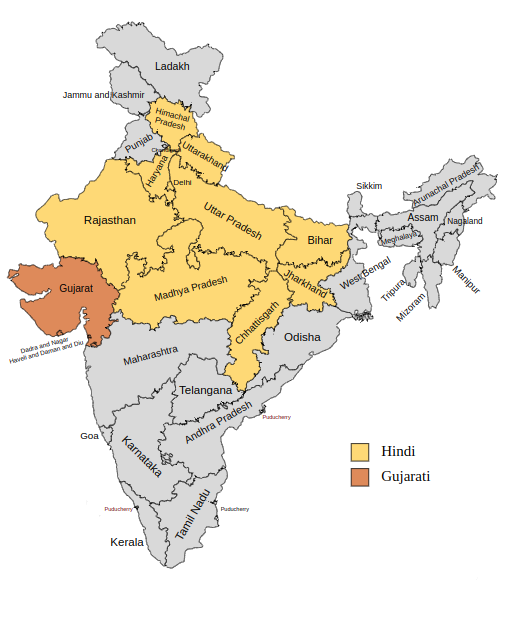Gujarati and Hindi: Language Similarities and Differences
Gujarati is the official language in the Indian state of Gujarat, the westernmost state in the country. To the east of Gujarati is the “Hindi Belt”. This Hindi-speaking region includes multiple states, as well as the national capital, Delhi.

Hindi and Gujarati belong to the same language family —they are both Indo-Aryan languages— which explains why they are fairly similar.
Interestingly, Gujarati and Hindi are distantly related to English. This is because Indo-Aryan languages are part of the vast family of Indo-European languages, which includes English and many of the other languages spoken in Europe (with a few exceptions such as Finnish, Hungarian, and Estonian).
While Gujarati and Hindi are closely related, it is worth noting that not all languages spoken in India share this connection. Several languages spoken in southern India, such as Tamil and Telugu, belong to the Dravidian language family, which is separate from the Indo-European language family.
Vocabulary comparison
Gujarati and Hindi are easy to distinguish in their written form because they use different scripts. The Devanagari script used for writing Hindi features a horizontal line running above the letters. Such a line is absent from the Gujarati script.
Hindi and Gujarati share many similar vocabulary words. Some examples of these are provided in the table below.
| English | Hindi | Gujarati |
|---|---|---|
| peace | शांति (śānti) | શાંતિ (shānti) |
| happiness | आनंद (ānand) | આનંદ (ānand) |
| love | प्रेम (prem) | પ્રેમ (prem) |
| path | मार्ग (mārg) | માર્ગ (mārg) |
| fruit | फल (phal) | ફળ (phaḷ) |
| city | शहर (śahar) | શહેર (śaher) |
| heart | दिल (dil) | હૃદય (hṛday) |
| fire | आग (āg) | આગ (āga) |
| river | नदी (nadī) | નદી (nadī) |
| forest | वन (van) | વન (van) |
| king | राजा (rājā) | રાજા (rājā) |
Gujarati was the native language of Mahatma Gandhi
Mahatma Gandhi, famous for his philosophy of nonviolence and his role in the Indian independence movement, was a native Gujarati speaker. Gandhi was born in the coastal town of Porbandar, in the Indian state of Gujarat where Gujarati is an official language.
Because of his role in the independence of India, Gandhi is considered to be the Father of the Nation of India, and is often referred to as “Bapu”, a Gujarati term of endearment meaning “father”. The term also exists in Hindi.
One notable contribution of Mahatma Gandhi to Gujarati literature was his translation of the Bhagavad Gita into Gujarati. The Bhagavad Gita is a Hindu scripture in the form of a philosophical dialogue between Krishna and Prince Arjuna. Gandhi considered the Bhagavad Gita to be a source of spiritual and moral guidance.
Gandhi wrote several books in Gujarati, including the book “Hind Swaraj” which serves as a powerful critique of colonialism. It outlines Gandhi's vision of true self-governance and explores the concept of "swaraj," which translates to “self-rule” or “home rule”. The book was banned by the British government in India.
Gandhi's autobiography, titled “The Story of My Experiments with Truth,” is another seminal work that he wrote in Gujarati. It serves as a spiritual and philosophical guide, providing a profound understanding of Gandhi's motivations and the basis of his transformative leadership.
Persian loanwords
Persian vocabulary words entered the Gujarati and Hindi languages during the period of the Mughal Empire. From the 16th to the 19th century, the Mughals governed the Indian subcontinent. They came from Central Asia and brought with them the Persian language.
In addition to this linguist influence, the Mughal Empire built some impressive architectural structures, in particular, the Taj Mahal in the city of Agra and the Red Fort in the city of Delhi.
| Hindi | Gujarati | Persian | English |
|---|---|---|---|
| शहर (shahar) | શહેર (śaher) | شهر (šahr) | city |
| फ़ौलाद (faulād) | પોલાદ (polād) | فولاد (fōlād) | steel |
| पुल (pul) | પુલ (pul) | پل (pol) | bridge |
| लाल (lāl) | લાલ (lāl) | لال (lâl) | red |
| बीमा (bīmā) | વીમો (vīmo) | بیمه (bime) | insurance |
| नाश्ता (nāśtā) | નાસ્તો (nāsto) | ناشتا (nâštâ) | breakfast |
| बत्तख़ (battakh) | બતક (batak) | بت (batt) | duck |
| फ़ायदा (fāydā) | ફાયદો (phāyado) | فایده (fâyede) | benefit |
| लश्कर (laśkar) | લશ્કર (laśkar) | لشکر (laškar) | army |
| बाज़ार (baazaar) | બજાર (bajār) | بازار (bâzâr) | market |